|
|
|
Sort Order |
|
|
|
Items / Page
|
|
|
|
|
|
|
| Srl | Item |
| 1 |
ID:
169043
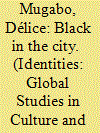

|
|
|
|
|
| Summary/Abstract |
Montreal, a city delimited by a French-speaking East and an English-speaking West, is often used as an example of how language can organize urban landscapes. That said, examining Black life in Montreal complicates that tidy narrative by illustrating how race, not language, configures the city. Broadly, this study examines the way racial and linguistic divisions play out in the geography of the city. More specifically, as it is grounded in Black geography and cultural geography, this paper highlights how Black activists in the 1990s made explicit the many ways in which Blackness in Montreal was rooted in a history and a geography that exceeds urban and national boundaries. Contesting an ethnicization that marked their Haitianness as outside Blackness, these activists also bridged smaller-scale divisions: those inscribed at the scale of the city that placed Haitians in the East and Black anglophone people in the West.
|
|
|
|
|
|
|
|
|
|
|
|
|
|
|
|
| 2 |
ID:
160642
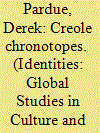

|
|
|
|
|
| Summary/Abstract |
The emergence of Kriolu or Cape Verdean Creole as a black identity should be understood in terms of chronotope, a dynamic iteration that combines time and place in the name of collective identity. The case of Cape Verdean migrants in Lisbon, Portugal, contributes to current debates on blackness as a ‘becoming’ and a complex set of practices by underscoring the role of encounters, both mundane and structural, in racialized formations. I draw from my fieldwork with Cape Verdean rappers and archival research in Lisbon between 2007 and 2013 to suggest that the particularities of Kriolu hold general theoretical lessons on the importance of migrancy and, by extension, space and temporality, in the process of racialization.
|
|
|
|
|
|
|
|
|
|
|
|
|
|
|
|
| 3 |
ID:
179009
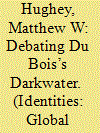

|
|
|
|
|
| Summary/Abstract |
The initial 1920 publication of W. E. B. Du Bois’s Darkwater: Voices from Within the Veil sold over 15,000 copies. Its initial 1969 reissue, and subsequent reprints, have since garnered even more sales and thousands of citations. Darkwater is now considered a classic. The centenary of the publication (1920–2020) provides an opportune moment to reflect on the book’s significance and disparate interpretations. In this article, I first examine the antecedents of Du Bois’s Darkwater. I then examine the book reviews, announcements, book club declarations, and advertisements and I subsequently map the variations of their coverage, debate, and emphases. I conclude with some thoughts on sociology’s relative dismissal of Darkwater until recent years and what sociology’s modest rediscovery of, and debates over, Du Bois portend.
|
|
|
|
|
|
|
|
|
|
|
|
|
|
|
|
| 4 |
ID:
187505
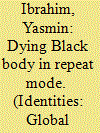

|
|
|
|
|
| Summary/Abstract |
What does it mean to watch a Black man dying in repeat mode? This paper deconstructs the notion of consuming Black death in a loop (or repeat mode) online and its redistribution in the virtual realm centring the Black body in this pornotropic assemblage. The spectacularisation of Black death and its juxtaposition as a banal encounter is examined against the history of slavery and White oppression. The enactment of Blackness as lacking form or ontology redrafts the virtual sphere in enacting a politics of refusal for reconstituting Blackness adduced through its fluidity. The virtual as an unstable and disembodied realm is re-read as a generative graveyard for reclaiming Black consciousness and Black humanism. In countering the ‘Black horrific’ the paper discerns digital platforms’ agentic and sensuous potential as a stage for performative insurgency to resurrect an affective Black body politic through the disembodied formlessness of the virtual sphere.
|
|
|
|
|
|
|
|
|
|
|
|
|
|
|
|
| 5 |
ID:
123930
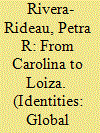

|
|
|
|
|
| Publication |
2013.
|
| Summary/Abstract |
This article considers the entanglements of race, culture and place in Puerto Rico. I analyse two distinct constructions of blackness that sustain racial hierarchies intrinsic to Puerto Rican 'racial democracy'. First, 'folkloric blackness' is a static, historicised version of blackness that represents Puerto Rico's African heritage without compromising the whitening bias of racial democracy discourse. A second construction of blackness that I term 'urban blackness' also circulates throughout the island, but instead serves as the counterpoint to the rest of the presumably 'whiter' Puerto Rico. Both have been emplaced within distinct, bounded locations, and affiliated with certain cultural practices. I argue that these 'emplacements' that arise from the associations between race, culture and place produce specific constructions of blackness that appear contradictory, yet ultimately work together to maintain the racial hierarchies intrinsic to racial democracy discourses.
|
|
|
|
|
|
|
|
|
|
|
|
|
|
|
|
| 6 |
ID:
089210
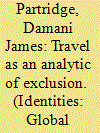

|
|
|
|
|
| Publication |
2009.
|
| Summary/Abstract |
This article examines the ways in which travel serves as an analytic to understand citizenship and the production of noncitizens after the Berlin Wall. This production is linked to a shift in the post-Wall German and European discourses and practices of asylum, which are significantly renegotiated and restricted shortly after the Wall falls. It is not only the law that changes, but also the mobility of the subjects perceived not to belong. The production of non-citizens is also related to official and unofficial articulations that attach Germanness to "Whiteness." "Black" subjects must not only negotiate their citizenship via real histories of mobility and displacement but also because their skin itself signifies travel and adventure. In the end, I write about the space that this imagination of travel and adventure through "Black" bodies both opens up and closes off for a politics based on "Blackness." I turn from normative accounts to the voices and bodies of "Black" subjects themselves.
|
|
|
|
|
|
|
|
|
|
|
|
|
|
|
|
|
|
|
|
|